Argentinian artist Marta Minujín, 74, has created a monumental replica of the Greek Parthenon from 100,000 copies of banned books. According to the artist, it symbolizes the resistance to political repression.
The Parthenon of Books in Kassel, Germany is part of the Documenta 14 art festival. With the help of students from Kassel University, Minujín identified over 170 titles that were or are banned in different countries around the world, and constructed the full-size replica of the iconic temple from those books, plastic sheeting, and steel.
But probably what is Germany’s most controversial book – Adolf Hitler’s “Mein Kampf” – will not figure on the Parthenon. And for a good reason: the Nazis were notorious censors of books. In fact, Minujín’s work stands on a historic site where the Nazis burnt some 2,000 books in 1933 as part of a very broad campaign of censorship. “Where they burn books, at the end they also burn people,” Heinrich Heine said in the 19th century.
More info: documenta14.de (h/t: mmm)
Image credits: Roman März
Image credits: alexgorlin
Image credits: si.leika
Image credits: lctanner
Image credits: rachelmijaresfick
Image credits: jingyinc
Image credits: voework
Image credits: thegood.thebad.thebooks
출처 https://www.boredpanda.com/parthenon-books-marta-minujin-germany/
------------------
Marta Minujín’s The Parthenon of Books is taking shape in Kassel
Marta Minujín’s The Parthenon of Books is taking shape in Kassel thanks to all of your generous donations.
To fully finish covering the scaffolding with forbidden books, the artist is kindly asking you to send us more books.
Only fourteen pillars to go!
For more information on the project and instructions for donating please see: www.documenta14.de/en/news/1601/call-for-book-donations.
----------------------
CALL FOR BOOK DONATIONS FOR THE PARTHENON OF BOOKS
Censorship, the persecution of writers and the prohibition of their texts motivated by political interests and attempting to influence our thoughts, our ideas, and our bodies, are once again widespread today.
The Parthenon of Books is a symbol of opposition to the banning of writings and the persecution of their authors. To realize this work, the Argentine artist Marta Minujín and the documenta 14 team are collecting books that have now been published anew after having been banned for years as well as those that are distributed legally in some countries but not in others. You are cordially invited to donate books and thus become part of the artwork.
The installation The Parthenon of Books will be presented in Kassel as a replica of the temple on the Acropolis in Athens, which symbolizes the aesthetic and political ideals of the world’s first democracy. Composed of as many as 100,000 banned books from all over the world, the work will be erected on Friedrichsplatz in Kassel, where some two thousand books were burned during the so-called “Aktion wider den undeutschen Geist” (Campaign against the Un-German Spirit). In 1941, the Fridericianum—which was still being used as a library at the time—was engulfed in flames during an Allied bombing attack, and another collection of some 350,000 books was lost.
Minujín’s The Parthenon of Books traces its origins to an installation titled El Partenón de libros, which was realized in 1983, shortly after the collapse of the civilian-military dictatorship in Argentina, and presented the very books that had been banned by the ruling junta. After five days of exhibition, two cranes tipped the building slightly to one side, allowing viewers to remove the books and take them home. A public action devoted to returning the once-forbidden books to circulation is also being planned for the new Parthenon at the end of documenta 14.
Marta Minujín and documenta 14 cordially invite the public, publishers, and authors to donate books for the artwork The Parthenon of Books and thereby become part of the work.
WHICH BOOKS CAN I DONATE?
This short list of more than 170 currently or formerly prohibited books, many of which are considered among the classics of world literature today, illustrates the global scope of censorship. The list below features a small selection of these books. The donated books do not necessarily need to have been published during the time of their respective prohibitions. documenta 14 welcomes donations of new editions, original editions, as well as several copies of the same title.
In collaboration with Prof. Dr. Nikola Roßbach, guest professor Dr. Florian Gassner, and students of the University of Kassel, a list of forbidden books from around the world has been compiled, which already contains more than 120,000 titles and can be consulted here. Over the course of the project this list will be continuously expanded.
Aristophanes: Lysistrata
Beecher Stowe, Harriet: Uncle Tom’s Cabin
Brecht, Bertolt: The Threepenny Opera
Brown, Dan: The Da Vinci Code
Carroll, Lewis: Alice’s Adventures in Wonderland
Cervantes, Miguel de: The Ingenious Gentleman Don Quixote of La Mancha
Coelho, Paulo: The Alchemist
Einstein, Albert: The Foundation of the General Theory of Relativity
Freud, Sigmund: Civilization and its Discontents
García Lorca, Federico: The Poet in New York
Goethe, Johann Wolfgang von: The Sorrows of Young Werther
Gombrowicz, Witold: Ferdydurke
Gordimer, Nadine: July’s People
Hašek, Jaroslav: The Good Soldier Švejk
Heine, Heinrich: Germany. A Winter’s Tale
Hikmet, Nazim: The Epic of Sheikh Bedreddin
Kafka, Franz: The Metamorphosis
Kästner, Erich: Fabian. The Story of a Moralist
Kazantzakis, Nikos: The Last Temptation
Kundera, Milan: The Unbearable Lightness of Being
Liao, Yiwu: The Corpse Walker: Real Life Stories: China From the Bottom Up
Machiavelli, Niccolò: The Prince
Mann, Thomas: Buddenbrooks
Marx, Karl, und Friedrich Engels: Manifesto of the Communist Party
Musil, Robert: The Confusions of Young Törless
Myrivilis, Stratis: Life in the Tomb
Neruda, Pablo: Twenty Love Poems and a Song of Despair
Orwell, George: Animal Farm
Pasternak, Boris Leonidovich: Doctor Zhivago
Remarque, Erich Maria: All Quiet on the Western Front
Rushdie, Salman: The Satanic Verses
Saint-Exupéry, Antoine de: The Little Prince
Salinger, J. D.: The Catcher in the Rye
Steinbeck, John: The Grapes of Wrath
Swift, Jonathan: Gulliver’s Travels
Tolstoy, Leo Nikolayevich: The Kingdom of God Is Within You
Twain, Mark: The Adventures of Tom Sawyer
Vargas Llosa, Mario: Aunt Julia and the Scriptwriter
Voltaire: Candide or, All for the Best
Beecher Stowe, Harriet: Uncle Tom’s Cabin
Brecht, Bertolt: The Threepenny Opera
Brown, Dan: The Da Vinci Code
Carroll, Lewis: Alice’s Adventures in Wonderland
Cervantes, Miguel de: The Ingenious Gentleman Don Quixote of La Mancha
Coelho, Paulo: The Alchemist
Einstein, Albert: The Foundation of the General Theory of Relativity
Freud, Sigmund: Civilization and its Discontents
García Lorca, Federico: The Poet in New York
Goethe, Johann Wolfgang von: The Sorrows of Young Werther
Gombrowicz, Witold: Ferdydurke
Gordimer, Nadine: July’s People
Hašek, Jaroslav: The Good Soldier Švejk
Heine, Heinrich: Germany. A Winter’s Tale
Hikmet, Nazim: The Epic of Sheikh Bedreddin
Kafka, Franz: The Metamorphosis
Kästner, Erich: Fabian. The Story of a Moralist
Kazantzakis, Nikos: The Last Temptation
Kundera, Milan: The Unbearable Lightness of Being
Liao, Yiwu: The Corpse Walker: Real Life Stories: China From the Bottom Up
Machiavelli, Niccolò: The Prince
Mann, Thomas: Buddenbrooks
Marx, Karl, und Friedrich Engels: Manifesto of the Communist Party
Musil, Robert: The Confusions of Young Törless
Myrivilis, Stratis: Life in the Tomb
Neruda, Pablo: Twenty Love Poems and a Song of Despair
Orwell, George: Animal Farm
Pasternak, Boris Leonidovich: Doctor Zhivago
Remarque, Erich Maria: All Quiet on the Western Front
Rushdie, Salman: The Satanic Verses
Saint-Exupéry, Antoine de: The Little Prince
Salinger, J. D.: The Catcher in the Rye
Steinbeck, John: The Grapes of Wrath
Swift, Jonathan: Gulliver’s Travels
Tolstoy, Leo Nikolayevich: The Kingdom of God Is Within You
Twain, Mark: The Adventures of Tom Sawyer
Vargas Llosa, Mario: Aunt Julia and the Scriptwriter
Voltaire: Candide or, All for the Best
HOW CAN I DONATE A BOOK?
You are very welcome to send books via mail to Athens or Kassel or drop them off in person. Please refer to the following addresses:
documenta 14
documenta und Museum Fridericianum gGmbH
Attention: The Parthenon of Books
Friedrichsplatz 18
D-34117 Kassel
documenta und Museum Fridericianum gGmbH
Attention: The Parthenon of Books
Friedrichsplatz 18
D-34117 Kassel
documenta 14 at Parko Eleftherias
Athens Municipality Arts Center
Attention: Parthenon of Books
Leoforos Vasilissis Sofias
GR-11521 Athens
Athens Municipality Arts Center
Attention: Parthenon of Books
Leoforos Vasilissis Sofias
GR-11521 Athens
documenta 14 at Polytechnion
Athens School of Fine Arts
Prevelakis Hall
Attention: Parthenon of Books
Patission 42
GR-10682 Athens
Athens School of Fine Arts
Prevelakis Hall
Attention: Parthenon of Books
Patission 42
GR-10682 Athens
Please find further donation points in Athens and Kassel as well as the donation form here. Supporters are kindly asked to complete the form and enclose it with their donation. In collaboration with the University of Kassel, all book donations will be examined, validated, and cataloged. The donation of several copies of the same title is explicitly encouraged.
Marta Minujín and the team of documenta 14 would like to thank you for your support.
CONTACT
If you have any questions about the project or your donation, we are happy to provide further information. If your donation exceeds 500 kg, please write us an e-mail prior to shipment.
Telephone Kassel: +49 (0)561 707 277 27
Telephone Athens: +30 210 300 406 9
E-mail: books@documenta.de
Telephone Athens: +30 210 300 406 9
E-mail: books@documenta.de
출처 http://www.documenta14.de/en/news/1601/call-for-book-donations

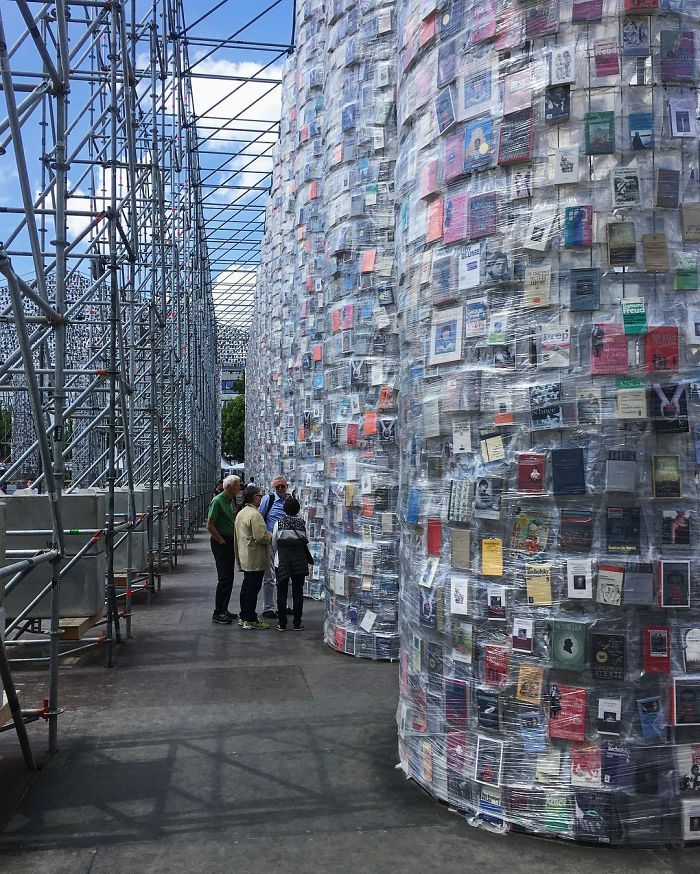
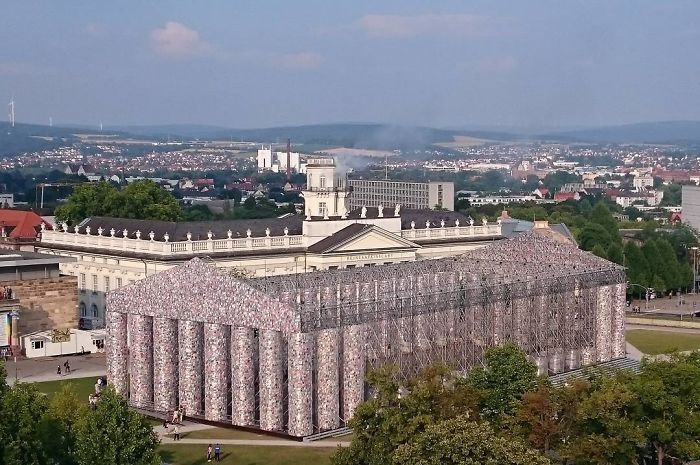
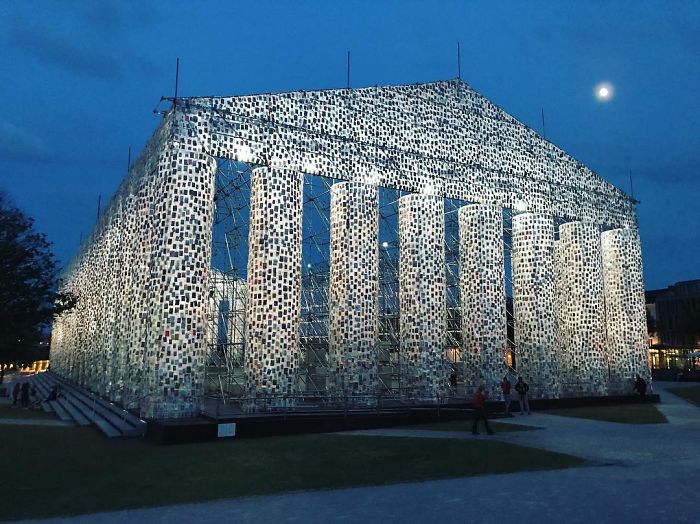

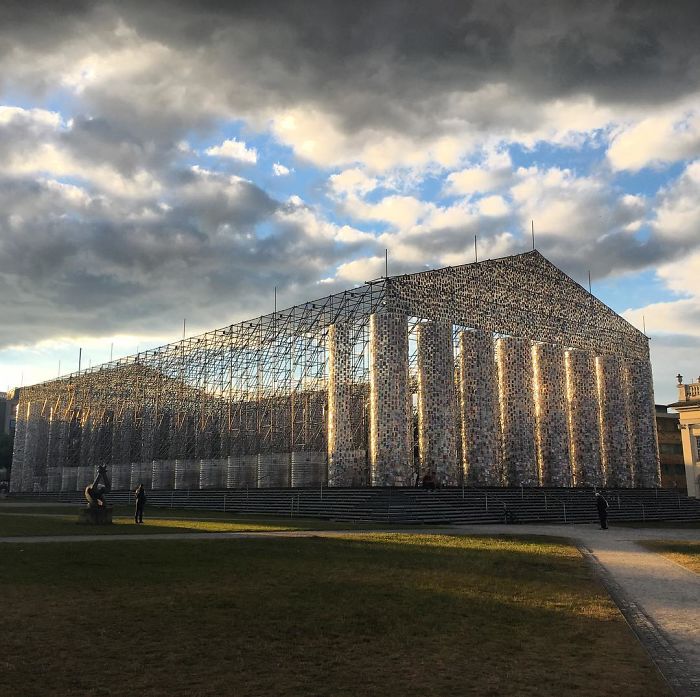
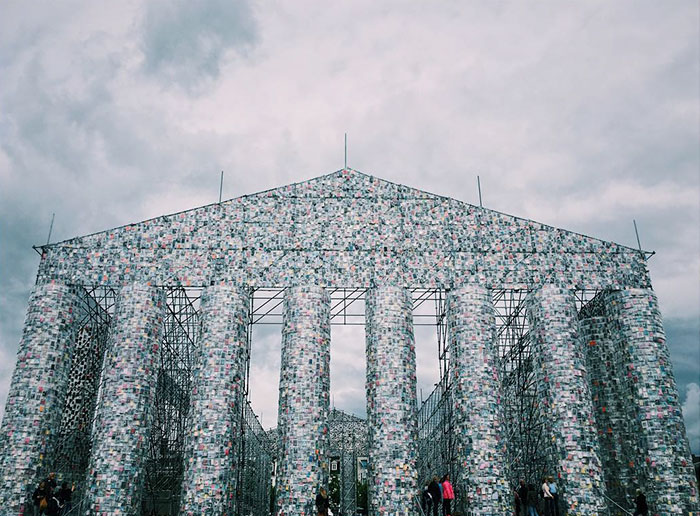

댓글 없음:
댓글 쓰기